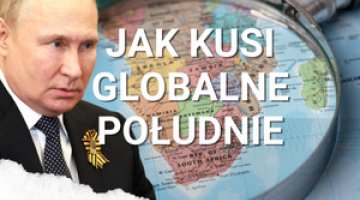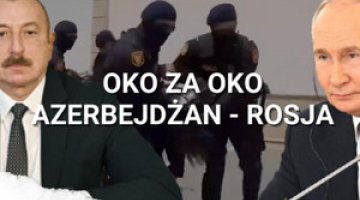Russia’s reaction to escalating protests and the resignation of Ukraine’s government
Russia sees the protests currently taking place in Ukraine as the most important development on the international stage at present and in the past week, both Russian politicians and the media there have repeatedly addressed this matter. Among those joining the discussion have been President Vladimir Putin, Foreign Minister Sergei Lavrov, as well as a number of lower-ranking diplomats, government officials and members of parliament. Furthermore, both chambers of the Russian Parliament: the State Duma and the Federation Council, have adopted statements on the situation in Ukraine (on 22nd and 29th January, respectively).
Russia is intent on portraying a negative image of the protests in Ukraine by highlighting their potential consequences, such as anarchy and the threat of the break-up of the country. Moscow’s criticism of the demonstrations has been accompanied by repeated expressions of support for President Viktor Yanukovych, who is being urged to remain firm in the face of the protesters’ demands. Alluding to Prime Minister Mykola Azarov’s recent resignation, Russia has implied that it will continue to support Ukraine through loans and gas discounts as long as the new government in Kyiv maintains the country’s current political course.
Respect for Russia’s national interests as a condition of further support
Russian politicians have described the resignation of Mykola Azarov’s government as a “courageous decision” taken to calm the current tensions in Ukraine. Speaking at a press conference following the Russia-EU summit on 28 January, President Vladimir Putin said were Kyiv to see a transfer of power to the opposition, this would not prompt Russia to abandon the promise of an economic bailout for Ukraine which it made in December (Russia has agreed to purchase Ukrainian government bonds worth US$15 billion, to reduce the price of natural gas from US$410 to less than US$270 per 1000 m3, and to increase collaboration between the two countries’ industries). Nonetheless, Putin made it quite clear that Russia would expect any new government in Ukraine to meet the economic conditions stipulated in the agreement. He also noted that Ukraine already owes Russia US$ 2.7 billion in unpaid gas bills, thereby cautioning Kyiv that any future Cabinet will have to be mindful of the Kremlin’s interests. Deputy Prime Minister Igor Shuvalov later added that in the event of a significant change in Kyiv’s policy, Moscow would seek a revision of the cooperation agreement.
Further protests could lead to a break-up of Ukraine
Russia has been highly critical of the recent protests in Ukraine. It continues to emphasise the legitimacy of Viktor Yanukovych’s leadership - as the country’s democratically elected president. Russian politicians have expressed concern over the growing aggression of the protesters, and have criticised both the Ukrainian security forces and the current leaders of the Ukrainian opposition for their failure to take control of the situation. A number of Russian officials (including President Vladimir Putin on his visit to Brussels, and Foreign Minister Sergei Lavrov in a series of telephone conversations with Western diplomats) have also highlighted what they see as fascist and anti-Semitic sentiments in the Maidan. They have expressed their astonishment at the fact that instead of this being condemned, the West continues to offer its support to the opposition movement.
Meanwhile, the Russian media have been emphasising the potential negative consequences of the demonstrations, and have portrayed the Ukrainian opposition as aggressive and intent on instigating violence. Occupations of government buildings and attempts to take control of centres of power, particularly in Western Ukraine, have received particularly negative media coverage in Russia. Interestingly, the media have not attached particular significance to the deaths of several demonstrators, implying that the victims were killed by members of the radical opposition who were interested in escalating the crisis.
Since 19 January, there has been an increase in the number of remarks suggesting the threat, or even the inevitability, of a break-up of Ukraine. Many of them have pointed to the mobilisation of pro-government groups and of Russians living in eastern and southern Ukraine (especially, in Crimea), who have been calling on the government to quell the protests by force and to maintain a pro-Russian course in foreign policy. It has been frequently suggested that allowing the pro-European opposition to take power in the country could fuel separatism in these regions. Finally, commentators have warned of the danger that a destabilisation, and especially a break-up, of the Ukrainian state would pose to the neighbouring countries and to Western Europe, including possible problems with the functioning of Ukraine’s nuclear power plants, and disruptions to gas transit.
Protests in Ukraine provoked by the West
Commenting on the unrest, Russian government officials have strongly suggested that the protests in Ukraine have been instigated and are being fuelled by “external factors”, namely, the countries of the EU and the United States. The West and individual Western politicians have been condemned for their involvement in the Ukrainian crisis and for the support they have offered to the demonstrators; Russia sees this as interfering in Ukraine’s domestic affairs. At the same time, Russia has been keen to emphasise its own neutrality towards the recent events in Ukraine and has suggested it would be willing to take on the role of mediator, should it be asked to do so. In addition, claims that the demonstrations were masterminded outside Ukraine have become a central theme of Russian media reports on the unrest. The media have repeatedly run stories alleging that hundreds of western “instructors” have arrived in Ukraine to help the opposition prepare for civil war, and continuously stress that Western politicians have been present at the rallies.
Conclusions
Russia on the international stage has been at pains to demonstrate its neutrality with regard to the recent events in Ukraine. This explains, for example, Vladimir Putin's assurances that Moscow’s cooperation deal with Kyiv would be honoured even following a change of government in Ukraine. Meanwhile, the message coming from many Russian politicians and from much of the media there suggests that Moscow disapproves of the Ukrainian government’s attempts to open dialogue with the opposition; it believes that a potential compromise would gradually force Yanukovych to give up power. This outcome would equate to a failure of Russian foreign policy and a threat to Russia’s national interests in Ukraine. Consequently, although the Kremlin has vowed not to cancel the bailout deal agreed in December, it has implied that Moscow will use Ukraine’s economic dependence in order to exert pressure on the Ukrainian government.
Russia’s official and media rhetoric has been geared towards creating a perception of the Ukrainian opposition as a group of anti-Semitic and fascist hooligans, thereby delegitimising them in the eyes of the international community. The Kremlin’s objective of nurturing a negative image of the Ukrainian protests in the state media, also bears significance for Russia’s domestic policy: namely, it is aimed at convincing the people of Russia that mass protests inevitably lead to violence and anarchy, and that liberal policies (such as tolerating demonstrations or permitting activities funded by Western NGOs) ultimately destabilise a country. Portraying the Ukrainian protests in this way, especially in the pro-Kremlin electronic media, suggests that the Russian government fears that the recent events in Ukraine could have adverse consequences for political stability in Russia.
Finally, the narrative constructed by Moscow highlights the involvement of foreign actors in orchestrating the Ukrainian protests. It would seem that the Russian government really does believe in the “conspiracy theory” explanation of the genesis of the unrest, in which the West is deliberately trying to destabilise Yanukovych’s pro-Russian regime. In this context according to the logic of the Kremlin’s propaganda possible destabilisation in Ukraine could result in the break-up of the country, and would thus backfire on Western interests in Ukraine. Finally, Moscow continues to claim that is remains a key player without whom a permanent stabilisation of the situation in Ukraine is not possible. At this stage, nothing suggests that Russia might indeed be interested in the breakup of Ukraine.





